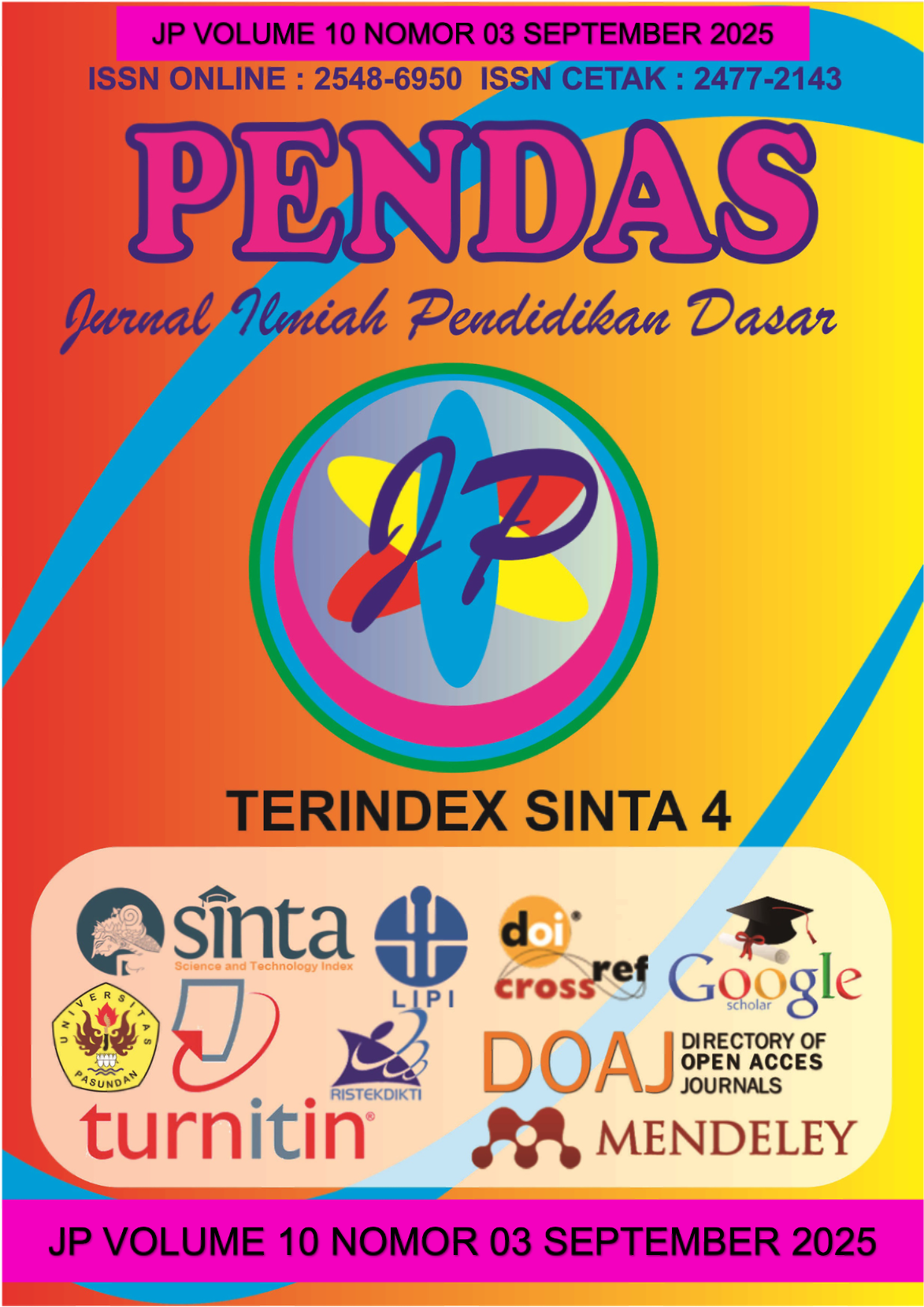PENGARUH PENERAPAN STRATEGI METAKOGNITIF TERHADAP HASIL BELAJAR KOGNITIF SISWA PADA PEMBELAJARAN IPAS KELAS V GUGUS I SUDIRMAN SURAKARTA TAHUN AJARAN2024/2025
DOI:
https://doi.org/10.23969/jp.v10i03.33495Keywords:
Metacognitive Strategies, Cognitive Learning Outcomes, Elementary School.Abstract
Students' thinking awareness in learning at school is not optimal because educators have not used appropriate strategies This study aims to determine the effect of applying metacognitive technique on students' cognitive them within the teaching and learning process fifth-grade science learning at SDN Gugus I Sudirman Surakarta, and to analyze the effectiveness of metacognitive strategies in increasing students' awareness and self-control of their learning process. This study employs a quasi-experimental design within a quantitative research framework One Group Posttest-Only Design with Nonequivalent. The research The study participants comprised 55 students, who were assigned to either an experimental group (n=27) or a control group (n=28). Data collection technique was through a A 20-item multiple-choice test that had been validated and tested for reliability was employed (0.739). Data were analyzed using normality, homogeneity, and an Independent Samples T-Test was conducted to compare the post-test results. The analysis revealed that the mean post-test score of the experimental group (78.15 was significantly higher than that of the control group (53.21). The research of the hypothesis test showed a t-test (2.964) > t-table (2.005) a significance level of 0.000 (p < .05) was found, which led to the conclusion that. The conclusion of this study is that metacognitive strategies have a significant and effective effect on improving students' cognitive learning outcomes in science learning.
Downloads
References
Algha, A., & All-Hatami, A. (2021). The impact of metacognitive strategies in English langue learning outcomes. Journal of Educational Research 45(3), 112-125.
Azizah, N., & Retnawati, H. (2021). Metacognitive skills and academic achiment : A study in Indonesian context. Journal of Educational Psychology 12(2), 89-102.
Fauzi, N., & Arifin, S. (2022). Metacognitive reflection and science problem-solving skills in elementary students. Journal of Science Educational 15(1), 45-58.
Handayani, S., & Hendriani, W. (2021). Self-regulated learning and metacognitive awareness in online learning. Indonesian Journal of Educational Studies 24(2), 134-145.
Jumanto, & Sarafuddin. (2023). Pelatihan penguatan pendidikan karakter peserta didik berbasis strategi metakognisi pada guru kelas SD. Journal of character education society 6(1).
Kurniawan, A. , & Wijayanti, D. (2022). Pengaruh metakognisi terhadap hasil belajar IPA ditinjau dari gaya kognitif siswa. Journal Basicedu 6(1),1024-1035.
Nurhayati, N. , & Suryana, Y. (2021). Pengaruh strategi metakognitif terhadap kemampuan berfikir kritis dan hasil belajar IPA siswa SD. Jurnal Pendidikan Sains Indonesia 9(2),234-248.
Rahmawati, F. ,Sari, D. P. , & Utami, R. (2021). Pengaruh strategi metakognitif dan konvensional pada pembelajaran IPA kelas IV SD. Jurnal Pendidikan IPA Indonesia 10(1),45-56.
Saputra, H. , Setiawan B., & Novitasari, D. (2020). Efektivitas model pembelajaran metakognitif dalam meningkatkan hasil belajar kognitif IPA siswa kelas V. Jurnal Ilmiah Sekolah Dasar 4(3),350-359.
Suryani, L., & Widyastuti, R., (2022). Penerapan strategi metakognitif dalam pembelajaran IPA di Indonesia. Jurnal Pendidikan Indonesiai, 11(3), 201-210
Zohar,A. , & Barzilai, S. (2020). Metacognitive strategies in online learning environments:Effects on cognitive outcomes. Journal Educational Technology Research and Development 71(1),78-92.
Downloads
Published
Issue
Section
License
Copyright (c) 2025 Pendas : Jurnal Ilmiah Pendidikan Dasar

This work is licensed under a Creative Commons Attribution 4.0 International License.



















